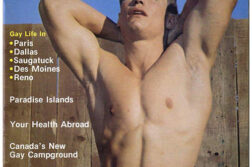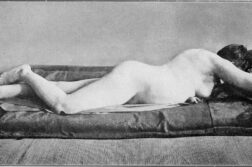Throughout the 1970’s and 1980’s, women’s bookstores and concert events carved out important spaces for cultural expressions of lesbian feminism in North America. During the latter part of that era I belonged to a private lesbian club called Herizon in Binghamton, New York, a community with a large lesbian population and a stellar Ph.D. program in women’s history at the state university, where I was completing my doctorate. The lively mix of academic and bar-dyke ambiance in Herizon’s membership kept us unusually self-aware that what we were doing was important in the historical moment; there were endless discussions about who we were and how to do outreach, with carefully scheduled Board meetings and elections (required in part to keep renewing our license as a private establishment permitted to exclude men). Herizon’s dues-paying membership included, at one point, over 300 women from a radius of 200 miles; we had a rock band, a theatre company, a restaurant, a campout, an annual New Year’s cabaret, and a radical Passover seder that drew dozens of non-Jewish participants—but the everyday tasks of bartending, repair, newsletter preparation, and planning key events fell to a small number of regular volunteers. Not surprisingly, burnout resulted.
Keeping Herizon open as “our” place where a member could drop in spontaneously to find warm sisterhood and cold beer meant a great deal to everyone. Yet by the late 1980’s, rounding up sufficient volunteers to staff the space five nights out of seven became an unrealistic goal. On some cold winter nights, only one woman might show up. We were committing the same few volunteers to hours of overtime when fewer and fewer patrons were making appearances aside from big events or scheduled weekend concerts by visiting artists. So, we devoted one of our big Annual Meetings to discussing this problem.






